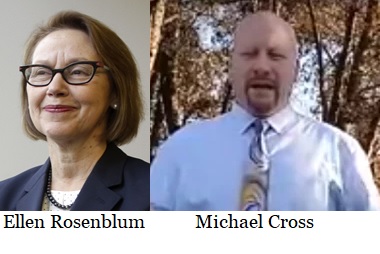
On this day, September 3, 1857, John McLoughlin (b.1784), Hudson's Bay Co. pioneer at Fort Vancouver and in Oregon Country, died in Oregon City. In the late 1840s his general store in Oregon City was famous as the last stop on the Oregon Trail.
 Post an Event
Post an Event
| Benton County Republicans’ Private Fundraising Event, “Bent-on Boots and Bling” with Trey Taylor |
| Friday, September 5, 2025 at 5:00 pm |
| Featuring Trey Taylor
Music Private Event
Friday, September 5, 2025 5:00-5:30 pm VIP Reception
5:30-8:00 pm Heavy Appetizers,
Auction, Concert
Red: $750 VIP Reception
Front Row Table Sponsor
White: $500 Table Sponsor
Blue: $50 per person
Limited Seating. Get Yours Now!!!
Support Local
Dress up: Bling, Cowboy, Patriotic Benton County Republican
FUNDRAISER
www.BentonGOP.org
Get your tickets today at:
https://www.bentongop.org/event-details/benton-county-republicans-fundraiser/form
About Trey:
Trey is the youngest African American Man in Country Music History. The Denver Post wrote
"It's impossible to miss his enthusiasm. With a fondness for cowboy boots, gaudy colors and dazzling jewelry, Trey Taylor could stand toe to toe with any of the Pop, Country or even Rap
contemporaries of his generation.“ |
| Trysting Tree Golf Club, 34028 NE Electric Rd., Corvallis |
Appointment is effective through June 2021
Governor Kate Brown has announced the appointment of Matthew Garrett as Wildfire Recovery Director, effective immediately. In this role, Garrett will serve as principal advisor to the Governor on recovery issues related to the 2020 wildfire season, develop a strategic recovery plan designed to consider the needs of all impacted Oregon communities, and lead the development of a 2021 budget and policy request that represents the total recovery needs of Oregon communities in collaboration with the Governor’s Disaster Cabinet and Wildfire Economic Recovery Council.
"As we begin the process of rebuilding after the historic wildfire devastation our state has seen, we need a seasoned leader like Mr. Garrett who understands the economics of our state, as well as the importance of bringing communities together," said Governor Brown. "His experience and approach will help us make good fiscal decisions while helping to address the needs of Oregonians in all our communities that have been impacted."
Garrett brings decades of experience to this role. He served as director of the Oregon Department of Transportation from 2005 to 2019 – the longest serving director in the state agency’s 100+ year history. Agency achievements under his leadership include receiving the largest funding package ever for transportation in Oregon (Keep Oregon Moving in 2017) and implementing the nation’s first operational per-mile road use charge. Previously at ODOT, Garrett served as Local Government Liaison, Chief of Staff, and as the Portland Region manager for ODOT. Before joining ODOT in 1997, he served on the personal staff of U.S. Senator Mark Hatfield from 1994 to 1997 in both his Washington, D.C. office and as Oregon field representative. Garrett was raised in Oregon and is a graduate of George Washington University.
--Ben Fisher| Post Date: 2020-10-13 06:37:20 | Last Update: 2020-10-13 07:10:18 |
Oregon State Treasurer
Editor's note: Oregon Abigail Adams Voter Education Project equips voters with information on how candidates stand on issues through a questionnaire process featured in comparison guides.
The Oregon State Treasurer is an elected constitutional officer within the executive branch of the Oregon state government. Incumbent Tobias Read (D, WF) is challenged by Jeff Gudman (R), Chris Henry (P, PG, I), and Michael P. Marsh (C).
The Office of the State Treasurer is the state's financial services hub and oversees a range of financial responsibilities, including managing the investment of state funds, issuing state bonds, serving as the central bank for state agencies and administering the Oregon 529 Savings Network and Oregon Retirement Savings Plan. More than any other state position, background and training are important to competency for handling billions of our dollars.
Read received a Master’s degree from University of Washington in Business Administration. He says his priority has been to help employees save for retirement by sponsoring the OregonSaves bill. It provides every worker the option of saving for retirement in a state invested account instead of an individual 401(k). Fourth on his list is a strong financial plan. “Our roads, bridges, and schools need critical investment.†Read led the creation of the Oregon Sustainable Bond Program, which will help fund affordable housing development. He also worked to reduce Oregon’s reliance on expensive out-of-state investment bankers, saving millions in unnecessary costs for state and local governments.
Gudman received a Master’s degree from Wharton School at University of Pennsylvania in Finance and Management. He works as an investor and prior financial analyst. His time on the Lake Oswego City Council he claims is the kind of leadership the state needs. “We dramatically reduced our unfunded liability for road maintenance, rebuilt our operations and maintenance center, and rebuilt city hall and the police station – all without asking for an extra dime from our residents. Oregon can do more with the revenue that we already have – without raising anyone’s taxes.†Gudman says his experience sets him apart, “How we manage our finances determines what we can afford: roads, schools, bridges – even PERS. As an experienced treasurer and analyst, I can offer reliable management of our state’s finances to help put our state back on strong financial footing.â€
Chris Henry won the nomination of the Independent, Progressive and Pacific Green Parties with 16 years as a Union Truck Driver. Prior to that he was a aircraft mechanic. He graduated from Portland State University in Communications/Civic leadership. Henry wants to stop Wall Street rip-off and “strongly support the formation of a Public Bank for the state of Oregon. Such a Public Bank would be operated as a public utility for the benefit of, not Wall Street bankers, all the citizens of Oregon. Such a bank would use the financial resources already present in the state for capitalization and then use those funds to support public benefit programs such as low interest student loans, or funding of much needed infrastructure renovations.†He also supports creating a post-carbon economy by de-constructing the fossil fuel infrastructure of asphalt streets by turning streets into community gardens.
Michael P Marsh won the nomination of the Constitution Party a retired with maintenance experience. He graduated from Lahabra High School is the only education listed.
Who do you want handling billions of taxpayer funds?
--Donna Bleiler| Post Date: 2020-10-12 23:30:41 | Last Update: 2020-10-12 23:35:26 |
Population increases pressure even the x-urbs
McMinnville is typical of Oregon towns in many ways.
It is running out of land zoned for residential and business development. In 2003, McMinnville identified the need to expand its Urban Growth Boundary by 1,188 gross acres (890 buildable acres). Of that 890 buildable acres, 537 were identified for housing needs. 1000 Friends of Oregon, a deep-pocketed environmentalist group and others opposed any increase.
McMinnville was allowed to bring in 217 acres of rural residential land to its UGB to serve its housing needs as a result of this effort. Not one acre of that 217 has been annexed by the city nor been developed to serve McMinnville’s housing needs.
The city has increasing need to fund PERS and health care for retired staff. Increased expenses can be met by new property taxes on new development or by raising taxes on existing property owners. With new development all but halted, the laws of supply and demand have driven the average cost of an average home in the city to over $400,000. Existing property owners are being financially squeezed as people leave Portland and other wealth centers for a simpler and more affordable life adjacent to first class health care and services.
McMinnville once again wishes to apply to the Land Use Board of Appeals for an enlarged UGB. The process will take time and millions of dollars with the outcome dubious at best. Our land use laws, strictest in the nation, have not changed substantially in 43 years. The UBG acreage was allowed to increase 10% in that time while the population has doubled.
One other effect of tight-fisted urban expansion policies is that they favor the "haves" over the "have nots." People who own property have an investment whose value consistently outpaces inflation. People who don't own property -- younger families and people who are disadvantaged for some reason -- get left behind as the price of real estate is out of reach.
--Tom Hammer| Post Date: 2020-10-12 09:07:20 | Last Update: 2020-10-12 16:56:59 |
A misunderstanding about paid leave
In a dispute over harassment, retaliation and paid leave, State Senator Sara Gelser has apparently fired a staffer who filed a complaint against her, shortly after the Senate Committee on Conduct cleared Gelser of any wrongdoing in the case.
The case was summarized in a 19 page report by a
third party investigator:
On December 30, 2019, Sen. Gelser told Ms. Hanson, her Chief of Staff, that Ms. Hanson’s “many consistent errors†were “not sustainable.†In response, Ms. Hanson raised allegations for the first time that Sen. Gelser had subjected her to a “toxic†and “abusive†work environment. Sen. Gelser considered the allegations serious and important, and immediately reported Ms. Hanson’s concerns to Jessica N. Knieling, Interim Human Resources Director. That same day, Ms. Knieling contacted Ms. Hanson to offer resources and support, and to better understand Ms. Hanson’s concerns regarding her work environment. Among other things shared, Ms. Knieling advised Ms. Hanson that the matter would be referred to an outside investigator pursuant to Rule 27 given the nature of the allegations. Ms. Hanson responded that she did not intend to initiate an investigation or even involve Human Resources. Two days later, however, on January 2, 2020, Ms. Hanson raised a new allegation that some of what she experienced was “retaliation†by Sen. Gelser for Ms. Hanson taking or attempting to take family medical leave.

The legislative branch rules on harassment, including Rule 27, are found in the
Legislative Branch Personnel Rules
The Senate Committee on Conduct includes Senator Denyc Boles (R-Salem), Senator Kathleen Taylor (D-Portland), co-chair Senator Chuck Thomsen (R-Hood River) and co-chair Floyd Prozanski (D-Eugene). By rule, the committee is balance with two members from each party.
According to the report,
The factual record is indisputable that: (i) Ms. Hanson remained on protected OFLA leave from October 29 through November 5 (though the medical certification stated that Ms. Hanson was able to return to work on November 2 or sooner if her symptoms had resolved); (ii) she received her full period of requested leave; (iii) she did not request any additional leave; (iv) there was no denial of requested leave benefits; (v) she was not required to perform any work during her leave; (vi) Ms. Hanson was reinstated to her same position; and (vii) Sen. Gelser encouraged her—on more than on occasion—to make sure she took the time she needed to heal and to not come back to work prematurely.
The report continues:
Ms. Hanson remains unwavering in her belief that Sen. Gelser was “pushing back on her for taking leave,†was “trying to take her leave away,†and was “fixated on taking [her] paycheck away from her.†This belief seems to have arisen after Ms. Hanson returned from leave and was triggered by communication regarding whether Ms. Hanson had sufficient paid time off to cover her leave and how to properly designate the leave. What the record bears out is that Ms. Hanson likely conflated two materially (and legally) distinct concepts: (1) her entitlement to protected leave, and (2) whether the leave would be paid.
The committee met on October 5 to consider the case. At the conclusion, the committee took five votes:
- Belongs to a protected class recognized under rule 27 (unanimous Yes)
- The respondent interfered with the impacted party's protected leave (unanimous No)
- The respondent retaliated against the impacted party for taking or attempting to take protected leave (unanimous No)
- The respondent engaged in harassment by engaging in verbal or physical conduct that did denigrate or show hostility because of their status as a member of a protected class (unanimous No)
- The respondent treated the impacted party less favorably because the impacted party made a good faith complaint about the conduct prohibited by Rule 27 or participated in the investigation into the conduct prohibited by this rule. (unanimous No)
It's not clear if the case will be further litigated.
--Staff Reports| Post Date: 2020-10-12 08:54:05 | Last Update: 2020-10-12 16:43:47 |
Everything burns and state government is no help.
On Sunday August 16th at about 2:00 pm, a small fire was spotted near Opal Creek Ancient Forest Center. Fire crews begin to respond, and reports start a day later by local news on August 17th. Oregon Governor Kate Brown is asked for assistance, but it's technically federal land, and just weeks prior, a special budget session was held slashing the "Natural Resources Budget", along with Fire Mitigation. Republican Representative Cedric Hayden, who serves on the subcommittee for Natural Resources gave a passionate speech, as a volunteer firefighter. Hayden urgently, and emphatically warned his colleagues that this fire season was going to be brutal, requiring full funding.
The Northwest Observer
reported the budget cuts, and echoed the warning on August 10th in an article titled "Cuts hit rural Oregon, Pray for rain".
Without desperately needed resources, including six Chinook helicopters, specifically made for and equipped with buckets, the Opal Creek fire quickly spread to neighboring Jaw Bone Flats, and Beachie Creek. Allowed to smolder and spread, due to jurisdictional squabbles, 39 fires had sprung up in various locations. Then the winds came. By labor day September 7th, much of Oregon was on fire. Many were beginning to wonder if help would ever arrive, as they began evacuating their homes and livestock.

An inquiry made by North West Observer to the Governor's office September 8th, asks when Conflagration Orders might be seen?
The very same day September 8th the White House reached out to Oregon Governor Kate Brown, offering help, services and asking the administration to please notify them as soon as their needs are clear via a "Wildfire Response Request". The email, seen here, was obtained by public records request.
Two days later, on September 10th, Oregon Governor Kate Brown held a press conference, at which time she's asked what resources have been requested from the federal government. Kate Brown replies "of course I've reached out to the White House, I've not had a response back". The next day, the White House follows up with Brown's administration, to address an MSNBC report of an unresponsive Trump Administration, and again offer whatever help might be needed.
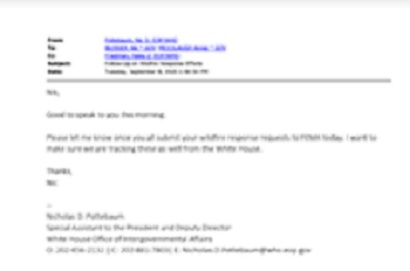
Brown's office, acknowledges the help and support from Trump, offering that "if asked", during her scheduled press conference at 1:00 pm, Brown would clarify the Trump administration and the State were working closely together. Brown's office is quick to fire back with a politically motivated, quid pro quo, stating "Thanks, we're also trying to dispel rumors with the FBI, and Local Law Enforcement assistance, that Antifa set the fires".
Essentially, Brown's aid twisted arms, during an election year, to help quash Antifa rumors, in exchange for honesty...
if asked for.
While politics have clearly played a role in fire response, it appears to have also played a role in the fire's beginning, and quick spread, as well. Tom Sleight, a third generation Molalla farm owner, joined by Nicole West featured here as the "Hillbilly Brigade", sat down with The Northwest Observer, to set the record straight about events witnessed first-hand, on the ground.
Sleight states that he received a call from his brother late Monday night of September 7th. The entire lowlands of Maple Creek, Willhoit, and surrounding areas were ablaze. The Sleight family has learned from years of experience, once Conflagration orders are placed, it can take an additional two to four days before state sanctioned help arrives. At that point in time, Kate Brown had not yet placed Conflagration orders, and both Sleight brothers knew there was no time to waste.
Tom Sleight withdrew approximately twelve thousand dollars from his safe, loaded up his tankers, and began running infrastructure up to the fire line, arriving around 4:30 am. "I just started handing out money to friends and family, telling everyone to go down to harbour freight and buy up all the trash pumps, gasoline, and water tanks they could find", Sleight chuckles.
Nicole West claims it's a deep mistrust of government, years of ineptitude, and failure of one party rule, that essentially saved rural Oregon. "Nobody even stopped to consider what Brown was going to do, we all knew it would be too little too late anyways."
West paints a vivid picture of just how effectively, ineffective our government has become. "It was painfully obvious which area was privately owned land, and which areas are government maintained" says West. Government controlled forestry had a 100 year duff layer in spots, smoldering and lighting roots on fire.
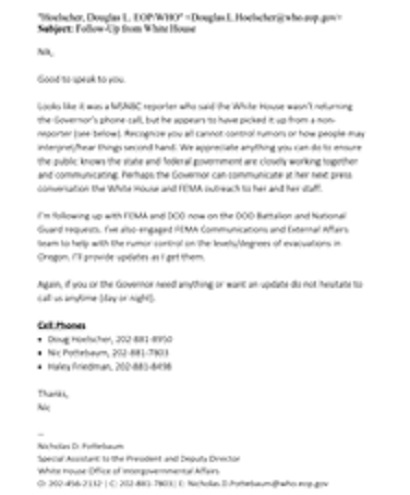
"That debris keeps in heat, and acts like an oven" Sleight stated, "on the other hand, the fires blow right through private land, as it's well cared for, well maintained, limbs cut back, and no fuels to keep it there smoldering."
Since the passing and adaptation of the Coho Salmon petition, and various bills last long session, including the "Wildlife Corridor Bill", sponsored by Portland based environmental groups, many gates have gone up, logging contracts gone unfulfilled, and the day use program for needy families to collect firewood ended, state and federally managed lands have grown unmanageable. Forest management is vital for carbon sequestration.
West believes Kate Brown, and Portland residents are out of touch with reality, "Portland is burning their city down, maybe ours too, but the difference is that we're working hard to save ours". "This isn't about climate change, and even if it was, we're going about it all wrong. Fires put more carbon into the atmosphere than all the cars on the road combined. We need to manage our forests properly, we could have stopped this in opal creek at ten acres, the total loss and devastation will cost far more, than had we properly managed the forest to begin with."
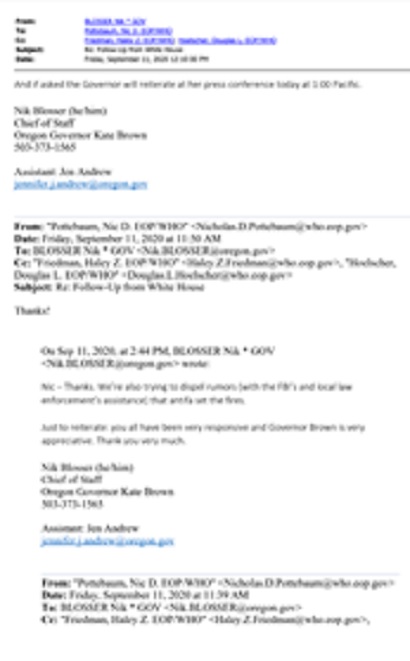
"Had Kate Brown actually compromised on
HB 2020 in 2019, we might have passed a bipartisan forest management bill. Instead of letting voters decide, she pushed lawmakers to walk out, which is all they can do against the democratic super majority" says James Hieb, who is running this election for Canby City Council.
Hieb and his family have also been impacted by the fires, "Many families, farms, businesses, and lives have been lost, unnecessarily to these fires, but mostly to an entrenched status quo that values party politics over human life. It's going to be a rough winter, food prices will go up due to lost local farms, a downed economy is killing jobs. Everything hinges upon this election in November." "National politics receive the lion share of media, but it all boils down to the local level, if a state thrives, or barely survives. Local leaders determine our daily lives, and how we're going to put the pieces back together".
At the time of this report, the White House was not available for comment regarding interactions with the Brown administration. Reports indicate that President Trump had flown in to personally check on residents of the fires, but have not yet been confirmed.
--Breeauna Sagdal| Post Date: 2020-10-12 08:38:09 | Last Update: 2020-10-12 21:26:07 |
Big money, out-of-state interests think so
If you think redistricting is no big deal, think again.
Article 1, Section 2 of the US Constitution calls for a
census every 10 years. Article IV, Section 6 of the
Oregon Constitution requires that the legislature redraw all the Congressional, State Senate and State Representative districts using that data. 2020 is the year in which the census will be taken and the 2021 Oregon Legislature will take on redistricting, which will take effect for the 2022 election.
If the Legislature fails to achieve a redistricting plan, the job falls to the Secretary of State. That will be whomever wins the November election for Secretary of State.
On October 2, Secretary of State Candidate, Shemia Fagan (D-Portland) accepted
a $100,000 contribution from the
National Democratic Redistricting Committee.
You'll remember earlier this year, when Fagan's longtime colleague, fellow Democrat and State Representative Alyssa Keny-Guyer publicly expressed
disappointment in Fagan's campaign including her fundraising.
For an office that is tasked with the fair administration of elections it's not only sad to see an out-of-state organization place such a heavy thumb on the scale, it's also sad to see a candidate -- Shemia Fagan -- running for this office who can't find the integrity to turn down such a donation.
--Staff Reports| Post Date: 2020-10-11 12:47:26 | |
The government tells housing providers how much they can charge.
The Oregon Department of Administrative Services last week published the annual maximum rent increase allowed by statute for calendar year 2021. The DAS Office of Economic Analysis has calculated the maximum percentage as 9.2%.
Following the passage of
SB 608 in the 2019 legislative session, Oregon law requires DAS to calculate and post to its website, by September 30 of each year, the maximum annual rent increase percentage allowed by statute for the following calendar year. Per statute, OEA calculates this amount as 7% plus the
Consumer Price Index for All Urban Consumers, West Region (All Items), as most recently published by the Bureau of Labor Statistics.
The allowable rent increase percentage for the 2021 calendar year is 9.2%. DAS will calculate and post the percentage for the 2022 calendar year by Sept. 30, 2021.
Information about the maximum annual rent increase percentage, as well as the provisions of ORS 90.323 and 90.600 (statutes governing rent increases), can be found on the
OEA website.
--Staff Reports| Post Date: 2020-10-11 08:27:29 | Last Update: 2020-10-11 08:42:05 |
Prosecution of rioters might be a better option
The City of Portland is currently one of America's most troubled urban areas.
Ted Wheeler has a
19-point plan to get re-elected. Portland is committing $12 million to Black and Brown communities. Significant reforms to local policing have been implemented. He is also directing all City bureaus to develop strategies to better serve Black communities.
Mayor Ted Wheeler says he has a plan, but his policies seem to exacerbate his problems in Oregon's largest city. Despite this, many think he might be the better choice over his opponent in the November election, who is a self proclaimed Antifa extremist named Sarah Iannarone.
The Wheeler administration has given an update on how they are handling this crisis:
The City of Portland is actively working to support the safe reopening and sustainable economic recovery of Portland’s downtown by ensuring our central west side is open for business, healthy, and safe. Portlanders and out-of-town visitors alike love our downtown neighborhoods, and we are excited to see them recover as we move through the worst of this year’s challenges. Our work includes the following:
Graffiti removal
Mayor Ted Wheeler and Commissioner Chloe Eudaly have committed $100,000 to graffiti removal in the areas of nightly protest. About $60,000 of that has been invested so far.
Trash clean-up
There have been three SOLVE litter clean-up events in downtown since June, resulting in 11,000 pounds of trash removal. In addition, Downtown Portland Clean and Safe has removed 22,160 bags of trash – totaling more than half a million pounds – since June. That’s about 24 garbage trucks’ worth of trash.
On Oct. 21, 2020, City Council will consider code amendments that will allow for more trash and debris removal. In addition, the City is participating in a Trash Coordination workgroup with other municipal and business partners to make sure we’re aligning our efforts and making the most of our collective resources.
Retail activation
Mayor Wheeler’s office is working closely with an array of partners including the Old Town Community Association, Portland Business Alliance, Travel Portland, public agencies, and other community partners to raise the profile of businesses that are open downtown.
Some of these efforts include:
- Launched the #BeTheChangePDX social media campaign, focused on supporting and promoting BIPOC-owned businesses in the central city. The campaign highlights ways Portlanders can be intentional about where they spend their money and support small local businesses, particularly those that are BIPOC-owned.
- Supported the Old Town Community Association collaboration with adjacent businesses to sponsor “The Market†featuring local vendors on NW Davis throughout the summer months. Prosper Portland is continuing to work with community and business partners to identify locations to continue this activation through the holiday and winter season.
- Sponsored the sixth-annual My People’s Market, at the corner of NW 5th Ave. and Davis Street, featured nearly 100 BIPOC-owned businesses. This sold-out event was held in late September.
- Working with BikeTown to create a video encouraging residents to explore and support the central city.
- Coordinating with the Portland Business Alliance and Travel Portland on parallel efforts, including:
- Portland Business Alliance launched its “Fall back in love with Portland†campaign for Downtown Portland focused on:
Safe Sleep Options
The pandemic has made it more complicated, and less safe, for people experiencing homelessness. The Mayor directed the Joint Office of Homeless Services to add several hundred new indoor shelter spaces through the fall and winter months. These spaces are open around the clock and provide food, showers, laundry, and housing navigation services. Together, Portland Parks & Recreation’s Charles Jordan and Mt. Scott Community Centers provide 175 safe spaces, and more will come online soon. The City also placed 100 portable toilets around our community to make sure that our most vulnerable community members continue to have access to this basic and essential service. Downtown was one of the first areas served.
Public safety
Residents, workers, and visitors should feel safe downtown. We are keeping the community up to date on the City’s full array of public safety initiatives and services, from significant reforms in the Mayor’s 19-point plan to community engagement opportunities and information about recent protest activity. The Portland Police Bureau (PPB) has increased its investigative resources and is working with the Multnomah County District Attorney to ensure successful prosecution of people who engage in violence or criminal destruction.
--Ben Fisher| Post Date: 2020-10-10 22:12:46 | Last Update: 2020-10-11 08:54:05 |
Clear policy distinction in race for Attorney General
Editor's note: Oregon Abigail Adams Voter Education Project equips voters with information on how candidates stand on issues through a questionnaire process featured in comparison guides.
In the past three years, Attorney General
Ellen Rosenblum has joined or filed suits against the Trump administration dozens of times. The question all Oregonians should be asking is at what expense. One of the suits is against the Trump administration over a rule allowing 3D-printed gun files to be released on the internet, which would give anyone with access to a 3D printer the ability to create a weapon. The ultimate issue is how far does free speech go when posting any information on the internet.
Michael Cross is clear on his Oregon Abigail Adams survey that “by shifting focus of time and money to litigate a President’s policies, what local issues are encroaching on Oregonians Rights? … The things that really impact every day Oregonians need to be addressed IMMEDIATELY. Rosenblum's defense is that the President is violating the constitution. If THAT is paramount on her mind, then why is she appealing circuit court judge's rulings for a NEW TRIAL for people WRONGFULLY CONVICTED of murder?â€
Rosenblum’s website identifies her as “a staunch advocate for common sense gun policy, testifying in favor of legislation to more closely regulate the sale and ownership of firearms.†Interpretation, she supports locking your guns in transit or safe storage at home when not legally carried, eliminating any crisis-use of the weapon.
Cross backs police against defunding. “Law enforcement must be able to do their job safely. Oregonians should feel safe in their homes.â€
Every session more gun control bills are introduced, no matter how many passed before and regardless of the lack of evidence that any previous law affected any crime rate. Universal background checks passed in Oregon in 2014, Rosenblum’s second year as AG, despite overwhelming opposition.
Rosenblum supports Oregon’s “red flag†law, which allows a relative, household member, or law enforcement officer to ask a court to remove guns from someone at risk of suicide or endangering others. The “Red flag law†passed in 2017, again under massive opposition and with a slimy move by holding a hearing and committee vote on short notice on Monday July 3, when everyone was away for the weekend and couldn’t show opposition. The next step is to end statewide preemption, which would allow local restrictions and thus make it difficult or impossible to conceal carry legally from county-to-county.
Cross doesn’t agree that courts provide sufficient review to confiscate guns and to error on the side of the defendant’s right to own a firearm. He supports the Second Amendment in that all American citizens have the right to keep and bear arms.
Rosenblum is so adamant on stronger background checks that she has a petition on her website to demand Congress pass universal background checks. She says, “Here in Oregon, I'm going to do my part and work to champion commonsense gun safety reforms. On the federal level, I will continue to push Congress to protect Americans from senseless gun violence.†We see her personal agenda in the dozens of law suits burdening Oregon taxpayer to fund.
The 50+% increase in gun sales indicates Oregonians are concerned about their safety.
--Staff Reports| Post Date: 2020-10-10 21:17:41 | |
Fears about future sessions associated with COVID-19
Oregon Senator Brian Boquist (R-Dallas) has called out Governor Kate Brown and the Democrats for proposing to delay the 2021 legislative long session in a statement:
“After a summer of Democrat-controlled special sessions that excluded Oregonians from the legislative process, they are now claiming Oregonians should be involved and that the session ought to be delayed. They fear working in proximity to other people without a vaccination, when the governor and Oregon Health Authority have admitted Oregon has one of the lowest COVID-19 mortality rates in the country.
“Led by Governor Brown, Democrats are ignoring the will of the people. Oregonians have been begging for the Capitol, schools, businesses, and the economy to be opened now. Enough tyranny under the guise of COVID-19.
“The arbitrary decisions that have shattered the economy are based on what generates income for the state. Marijuana and liquor stores have stayed open during the political pandemic; both of which fund state programs. Public university dorms are open and generate revenue for the state, yet public schools remain closed, unless they are used for child care, that parents must pay for, despite paying property tax for public education.
“Democrats prioritize the rights of violent anarchists rioting in Portland night after night, over all Oregonians whose lives are impacted by legislation crafted in the marble walls of the Capitol. It is imperative the session is not delayed.â€
The Oregon Constitution provides that the long session duration is 160 days, regardless of when it begins, but it must begin on the day provided by law:
Article IV, Section 10. Annual regular sessions of the Legislative Assembly; organizational session; extension of regular sessions. (1) The Legislative Assembly shall hold annual sessions at the Capitol of the State. Each session must begin on the day designated by law as the first day of the session. Except as provided in subsection (3) of this section:
(a) A session beginning in an odd-numbered year may not exceed 160 calendar days in duration; and
(b) A session beginning in an even-numbered year may not exceed 35 calendar days in duration.
(2) The Legislative Assembly may hold an organizational session that is not subject to the limits of subsection (1) of this section for the purposes of introducing measures and performing the duties and effecting the organization described in sections 11 and 12 of this Article. The Legislative Assembly may not undertake final consideration of a measure or reconsideration of a measure following a gubernatorial veto when convened in an organizational session.
(3) A regular session, as described in subsection (1) of this section, may be extended for a period of five calendar days by the affirmative vote of two-thirds of the members of each house. A session may be extended more than once. An extension must begin on the first calendar day after the end of the immediately preceding session or extension except that if the first calendar day is a Sunday, the extension may begin on the next Monday.
While the full effects of a delay are not clear, holding session with COVID-19 regulations in place may slow the pace of legislation. Delaying the session until some or all of the COVID-19 regulations are lifted may speed the pace of legislation.
--Ben Fisher| Post Date: 2020-10-10 09:23:12 | Last Update: 2020-10-10 09:28:53 |
Results give the Governor ammunition to keep state closed
The Oregon Healthy Authority surveyed 1,000 Oregonians regarding their thoughts and behavior around the COVID-19 outbreak. The survey, conducted by DHM Research, found the following:
- More than eight in 10 report wearing masks nearly all of the time while in public indoor spaces.
- More than two in three avoid crowded places.
- More than six in 10 are staying 6 feet apart when in public.
The survey also found the following about how often people attend gatherings:
- OSA reports: Half of Oregonians report attending about four or more social gatherings in the previous two weeks. Survey says: Half of Oregonians attended 3 or fewer gatherings in the past two weeks.
- One in five Oregonians say they have attended at least one social gathering of more than 10 people in the past two weeks.
- One in three say they gather with fewer people outdoors.
A separate survey of 468 Latinx Oregonians conducted in Spanish by Lara Media found the following:
- 87% of respondents report wearing a face mask nearly all of the time while in public indoor spaces.
- More than half of respondents avoid crowded places.
- More than six in 10 are staying 6 feet apart when in public.
The survey found different levels of concern about COVID-19 among respondents based on age, geography, political views and race/ethnicity. Latinos expressed higher levels of concern than whites and reported wearing masks more frequently. Members of the Latinx community have accounted for nearly 40% of Oregon’s COVID-19 cases.
Oregon Health Authority Director Patrick Allen said, “These results show that nearly all Oregonians understand it’s important to wear a mask. But fewer Oregonians believe they’re at risk of getting sick and too many people are socializing indoors in bigger groups. It’s hard to sustain the changes we’ve all had to make in our lives to keep ourselves and others safe from COVID-19. But we won’t be able to prevent more infections, and get more schools and businesses open in Oregon, until more people act with urgency and avoid the social super-spreader gatherings that have driven COVID-19 transmission and disease in Oregon.â€
Fox News interviewed Wesley Smith, Discovery Institute, on facing extreme COVID-19 surveillance. There is a great deal of push by the government for mandatory vaccinations. He reports that U.S.A. Today said it could include: “Vaccine refusers could lose tax credits or be denied nonessential government services. Health insurers could level higher premiums. You couldn’t enter private businesses unless you showed your vaccine papers.†It’s preparing the ground for Draconian advocacy, Smith says, and Dr. Fauci is claiming global socialist engineering is needed to prepare for future pandemics by changing the way we live, changing water systems and changing the way we travel. He isn’t even talking about COVID-19. Is this where Governor Brown is headed?
One interesting number in the survey may indicate where the Governor is getting her cues. The survey shows 94% Liberals are concerned about COVID-19 in Oregon compared to 58% Conservatives.
--Donna Bleiler| Post Date: 2020-10-10 08:14:04 | Last Update: 2020-10-10 09:29:53 |
Businesses are eligible to receive up to $50,000
Millions in grant funding is available for small businesses facing lost revenue in the midst of the COVID-19 pandemic. Business Oregon awarded the final round of its Emergency Business Assistance Grant funding to intermediary organizations across Oregon to in turn provide grants directly to eligible small businesses. The fund was created by Governor Kate Brown and the Oregon legislature, funded with both federal CAREs Act funds and state funds.
“We reallocated some of our own budget and paired that with millions in federal funding to deliver this much-needed help to Oregon’s small businesses,†said Business Oregon Director Chris Cummings. “We stand as partners with the business community in this pandemic, and I hope every eligible small business accesses this final round of funding from this program.â€
Businesses are eligible to receive up to $50,000 in funding as detailed in the application.
Eligibility requirements have been expanded to allow for more business to get funding than in previous rounds. Businesses that have received less than $100,000 in small business assistance through the CARES Act (such as PPP, EIDL, EIDLA, City of Portland Small Relief Program, the Oregon Cares Fund for Black Relief + Resiliency and other programs) are now eligible. Additionally, even if a business was not prohibited from operations by the Governor’s Executive Order 20-12, the business could be eligible if it can demonstrate a 25% reduction in sales (reduced from 50% previously required) over a 30-day period in 2020 compared to a comparable period in 2019.
Also, any business that has already received a grant from this program is eligible for an additional award and should complete the supplemental application. This is a shorter application with less documentation needed. Businesses can expect to receive an award comparable to their prior award.
The following organizations have funding available. The application these organizations will need can also be found on
Business Oregon's website in multiple languages to access ahead of time.
Regional Intermediaries and Counties
CCD Business Development Corporation – Coos, Curry and Douglas County
Southern Oregon Regional Economic Development, Inc. – Jackson, Josephine County
Community Lending Works – Benton, Lane, Lincoln and Linn County
Mid-Willamette Valley Council of Governments – Marion, Polk and Yamhill County
/
Micro Enterprise Services of Oregon – Clackamas, Multnomah and Washington County
Columbia-Pacific Economic Development District – Clatsop, Columbia, Tillamook and Western Washington County
Clatsop County
Columbia County
Tillamook
Col-Pac/West Washington County: NW Oregon Emergency Small Business Grants
Northeast Oregon Economic Development District – Baker, Union and Wallowa County
Greater Eastern Oregon Development Corporation – Gilliam, Grant, Harney, Malheur, Morrow, Umatilla and Wheeler County
Central Oregon Intergovernmental Council – Crook, Deschutes and Jefferson County
Mid-Columbia Economic Development District – Hood River, Sherman and Wasco County
South Central Oregon Economic Development District – Lake and Klamath County
Statewide Intermediaries
Affiliated Tribes of Northwest Indians Economic Development Corporation – Statewide
Central Willamette Credit Union – Statewide
Point West Credit Union – Statewide
In addition to the Emergency Business Assistance Grant program, Business Oregon is providing
free masks, gloves and other protective supplies to small businesses.
--Ben Fisher| Post Date: 2020-10-09 18:54:29 | Last Update: 2020-10-11 08:53:25 |
Read More Articles






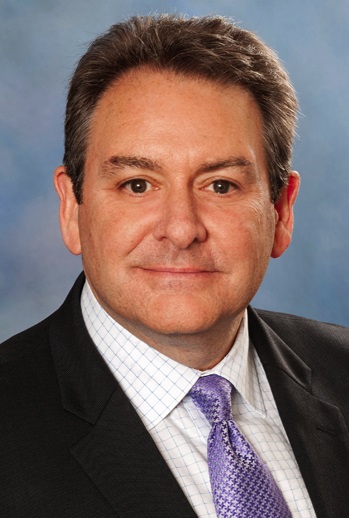
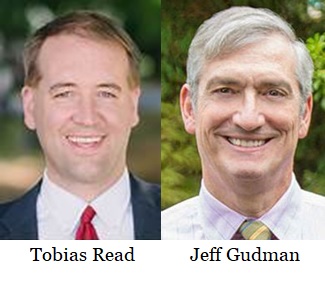


 The legislative branch rules on harassment, including Rule 27, are found in the Legislative Branch Personnel Rules
The Senate Committee on Conduct includes Senator Denyc Boles (R-Salem), Senator Kathleen Taylor (D-Portland), co-chair Senator Chuck Thomsen (R-Hood River) and co-chair Floyd Prozanski (D-Eugene). By rule, the committee is balance with two members from each party.
According to the report,
The legislative branch rules on harassment, including Rule 27, are found in the Legislative Branch Personnel Rules
The Senate Committee on Conduct includes Senator Denyc Boles (R-Salem), Senator Kathleen Taylor (D-Portland), co-chair Senator Chuck Thomsen (R-Hood River) and co-chair Floyd Prozanski (D-Eugene). By rule, the committee is balance with two members from each party.
According to the report,




 "Had Kate Brown actually compromised on HB 2020 in 2019, we might have passed a bipartisan forest management bill. Instead of letting voters decide, she pushed lawmakers to walk out, which is all they can do against the democratic super majority" says James Hieb, who is running this election for Canby City Council.
"Had Kate Brown actually compromised on HB 2020 in 2019, we might have passed a bipartisan forest management bill. Instead of letting voters decide, she pushed lawmakers to walk out, which is all they can do against the democratic super majority" says James Hieb, who is running this election for Canby City Council.



